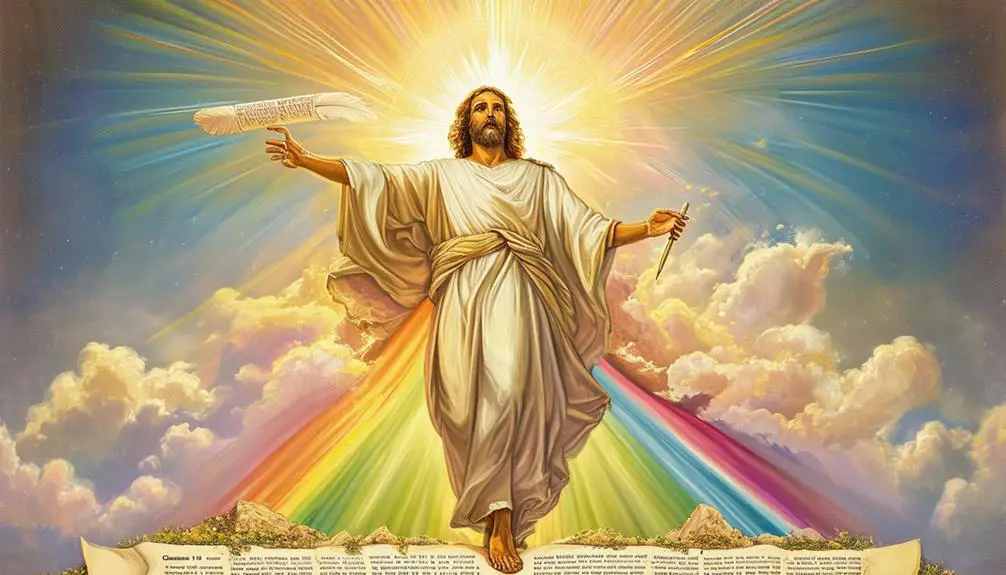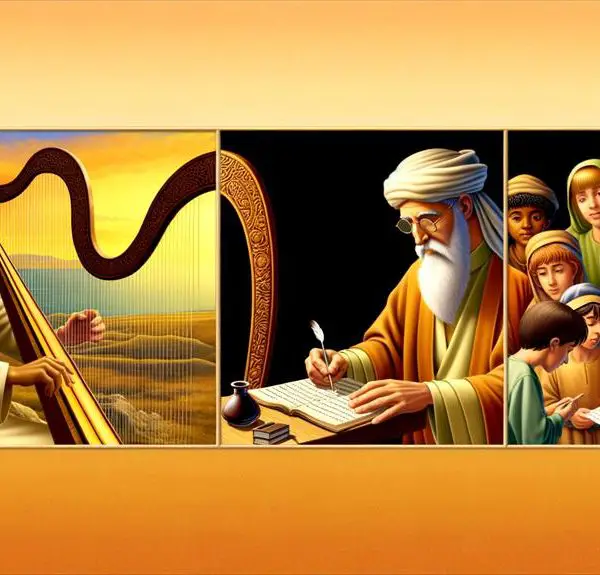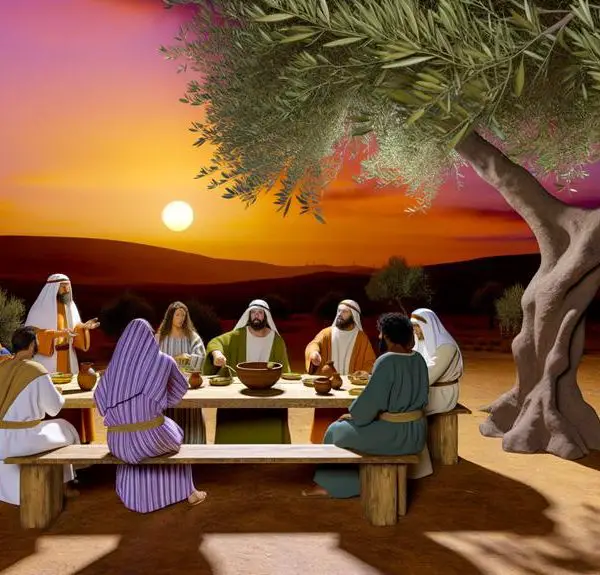P'onder the profound implications of Genesis 15's divine covenant in our detailed Bible study, revealing timeless lessons for modern faithfulness.

Bible Study – The Book of Genesis – Chapter 15 – Summary and Analysis
In Genesis 15, you encounter a pivotal moment in biblical history – the divine covenant with Abram. You explore Abram's struggle and God's reassurances, promises of innumerable descendants, and future land possession. This chapter, steeped in sacrificial symbolism, holds profound theological implications, underscoring God's unchanging nature and faithfulness even amidst human doubts. It shapes the Abram's legacy and sets trajectory for the bible. But, there's more to it. Probe deeper, you'll unearth richer insights, unravel the intricate symbolism, and grasp the timeless lessons this covenant journey presents for modern faithfulness.
Key Takeaways
- Genesis 15 details God's covenant with Abram, promising numerous descendants and land possession, marking a pivotal moment in biblical history.
- Abram's faith in God's promise, despite his doubts, illuminates the importance of divine reassurance and faithful obedience in the human-divine relationship.
- The covenant ceremony, signified by the bisection of animals and the appearance of a smoking fire pot and flaming torch, underscores God's unchanging nature and presence.
- The starry promise represents God's faithfulness, with the countless stars symbolizing the innumerable blessings promised to Abram and his descendants.
- The chapter's theological underpinnings, including divine assurance and human faith, continue to resonate in modern Christianity, underscoring the importance of maintaining faithfulness.
Historical Context of Genesis 15

In order to fully grasp the depth of Genesis 15, it's imperative that you understand the rich historical context in which it was written. This chapter is set in a time of ancient civilizations, where divine interactions were perceived as pivotal to human existence. It's here that Abram's doubts and divine reassurances become tangible.
Abram, later known as Abraham, lived in the Bronze Age, around 2000 BC, and was a prominent figure in the Hebrew Scriptures. His life was marked by a series of divine encounters, which often resulted in profound transformations. However, even Abram, the paragon of faith, had his moments of doubt. These instances of skepticism are important to understanding his character and his relationship with the divine.
Genesis 15 is a reflection of these struggles, portraying a remarkably human Abram grappling with doubts about his future, his legacy, and the fulfillment of God's promises. Yet, in the face of these doubts, there is a powerful narrative of divine reassurances. God responds to Abram's anxieties with reaffirmations of His promises, providing a beacon of hope in the midst of uncertainty. This dynamic interaction between the human and the divine is a key element in the historical context of Genesis 15.
Detailed Summary of Chapter 15
In understanding Genesis Chapter 15, you must focus on the key events: the Covenant with Abram, the Vision of Sacrifices, and the Promise of Descendants. Each element carries significant depth and symbolism, requiring careful examination and interpretation. Your challenge is to dissect these complexities and weave together an intricate yet concise narrative.
Covenant With Abram
Delving into the heart of Genesis Chapter 15, you'll find the Covenant with Abram, a pivotal moment that sets the stage for the narrative's ensuing drama. This covenant, initiated by God, marks a turning point in Abram's faith journey and serves as Divine assurance of God's commitment to Abram and his descendants.
The covenant is characterized by:
- God's promise of innumerable descendants to Abram, reinforcing Abram's faith and establishing a lasting relationship.
- The Divine assurance that Abram's descendants will possess the land, assuring their future.
- The stipulation that Abram must uphold his end of the covenant, embodying the reciprocal nature of covenants in biblical times.
This covenant, hence, is not just a divine promise, but a binding agreement that sets the trajectory for the biblical narrative.
Vision of Sacrifices
To fully comprehend the significance of Genesis Chapter 15, you've got to grapple with the 'Vision of Sacrifices,' a intricate yet crucial part of the narrative. This vision, steeped in sacrificial symbolism, reveals a covenant ritual involving animal sacrifices. God instructs Abram to gather specific animals and divide them, except for the birds.
In your visionary interpretation, you'll notice that the birds of prey descending on the carcasses symbolize threats to God's promises. However, Abram drives them away, illustrating a steadfast faith. This profound vision underscores God's covenant with Abram.
Aspect |
Interpretation |
|---|---|
Animal Sacrifice |
Covenant Ritual |
Birds of Prey |
Threats to Promise |
Abram's Action |
Faithful Stewardship |
Sacrificial Symbolism |
Covenant Confirmation |
Visionary Interpretation |
Divine Revelation |
Therein lies the beauty and complexity of this visionary narrative.
Promise of Descendants
Unraveling the promise of descendants, you'll find God's assurance to Abram forms the crux of Genesis Chapter 15, an assurance that his offspring would be as numerous as the stars in the sky – a promise that instills hope and shapes the trajectory of biblical history. This divine guarantee signifies the 'Descendant's Legacy' and the 'Ancestral Impact' that weaves through the fabric of the Bible.
The key aspects of this promise include:
- The reaffirmation of Abram's faith and his standing with God.
- The anticipation of a multitude as his progeny, despite his current childless state.
- The forward-looking vision of the promised land given to his descendants.
This promise not only affirms Abram's role but also underscores God's commitment to His people, shaping the overarching narrative of the Bible.
Key Characters in Genesis 15
As you turn your attention to the key characters in Genesis 15, note the significance of Abram's covenant journey and God's revealed promises. This chapter provides a rich opportunity for you to analyze the complex dynamics between God and Abram. You'll discover the profound implications of their interactions and the foundational role they play in shaping biblical narratives.
Abrams Covenant Journey
Delving into Abram's covenant journey, you'll encounter a tapestry of key characters that greatly influence the narrative of Genesis 15. Here, Abram's faith becomes a central theme as he sets out on a divine journey, guided by his unwavering belief in God. The covenant's significance is highlighted as God's promise to his faithful servant.
- Abram's Faith: His trust in God's promise, despite initial doubt, underscores the depth of his faith.
- Covenant Significance: It establishes God's relationship with Abram and his descendants, a promise carrying profound implications.
- Divine Assurance: God reassures Abram of his promise, strengthening Abram's faith.
Abram's journey is a testament to the power of faith and the importance of covenants in divine-human relationships. This narrative provides valuable insights into the theological underpinnings of Genesis 15.
Gods Promises Revealed
In the intriguing narrative of Genesis 15, you'll discover God's promises being revealed through key characters, each playing a pivotal role in the unfolding covenantal story. You'll see the Divine Assurance given to Abram, assuring him of an heir and a multitude of descendants. God's pledge is not merely verbal; He enacts a formal ceremony, affirming His Covenantal Faithfulness.
Next, you'll witness the prophetic vision of Israel's future bondage and deliverance, a stark reminder of God's omnipotence. The narrative concludes with God reaffirming His promise of land to Abram's descendants. This chapter paints a vivid picture of God's promises being revealed with a depth and complexity, underscoring His unwavering faithfulness and covenantal commitment.
Analysis of God's Promises

Through the lens of Genesis Chapter 15, you'll uncover a tapestry of divine promises, each intricately woven with profound implications for humanity's spiritual journey. Here, God's divine assurance to Abram is a focal point, marking a pivotal moment in biblical history.
The narrative unfolds with two distinct layers of promise fulfillment. Next, you'll see God's assurance to Abram about his numerous descendants, a promise to be fulfilled through natural means. Additionally, there's the promise of land, an inheritance for Abram's descendants. This is a more complex promise, as it points towards a supernatural fulfillment, a divine intervention that transcends human understanding.
To further analyze these promises, consider the following points:
- God's promises are unchanging: Despite Abram's doubts and fears, God remains steadfast in His promises, demonstrating His unwavering reliability.
- God's promises are certain: They are not merely possibilities or probabilities, but rather, they are divine assurances with guaranteed fulfillment.
- God's promises transcend human limitations: They are not dependent on human abilities, but are fulfilled through divine power, showcasing God's sovereignty.
Thus, examining God's promises in Genesis 15, you'll gain a deeper understanding of the divine assurance and promise fulfillment that anchors the faith of believers.
Understanding Abram's Response
Abram's response to God's promises, a significant blend of faith and doubt, provides an important insight into his spiritual journey and his evolving understanding of God's divine plan. You see, Abram's faith is not a blind faith, but one that questions, seeks understanding, and yet trusts in the promises of God. Abram's doubts reflect his humanity and his struggle to comprehend God's grand design. But, in the midst of his doubts, Abram's faith shines through as he believes in the promises of God, trusting Him for the fulfillment of the covenant.
Abram's Response |
Analysis |
Significance |
|---|---|---|
Expresses Doubt |
Questions God's promise due to his childless state |
Reflects his humanity and struggle to comprehend God's plan |
Demonstrates Faith |
Believes God despite his circumstances |
Illustrates trust in God's promises, and faith beyond understanding |
Seeks Reassurance |
Asks for a sign from God |
Shows his desire for deeper understanding and confirmation of God's will |
Symbolism in Genesis 15

You are now invited to explore the rich symbolism found in Genesis 15, a chapter dense with profound meaning. The covenant ritual, a seemingly arcane practice, holds much significance that is worth your examination. Similarly, the promise embodied in the stars, while poetic in nature, carries a weighty interpretation in the context of Abram's narrative.
Covenant Ritual Meaning
What's the deeper meaning behind the covenant ritual in Genesis Chapter 15, you might wonder? The ritual symbolism and covenant significance are profound.
- Bisection of Animals: Symbolizes the seriousness of the covenant. Each party walks between the halves, indicating that breaking the covenant can result in a similar fate.
- Smoking Fire Pot and Flaming Torch: Represents God's presence, confirming His commitment to the covenant.
- Deep Sleep and Darkness: Signifies Abram's passive role. God alone initiates and guarantees the covenant.
These elements collectively underscore God's commitment to His promise. The covenant is not just a contract but a divine guarantee. It's important to approach this text with the understanding that the covenant ritual in Genesis 15 is a tangible representation of God's unshakeable promise.
Starry Promise Interpretation
Diving into the starry promise of Genesis 15, we find a wealth of symbolic interpretation that enriches our understanding of God's covenant with Abram. The astronomical symbolism isn't just a poetic device; it carries profound theological implications. God's promise to make Abram's descendants as numerous as the stars signifies an abundant, uncountable blessing. This promise fulfillment is not immediate, mirroring the slow, gradual movement of celestial bodies. Just as stars appear small from earth but are large in reality, Abram's descendants would start small but grow into a mighty nation. This astral metaphor provides a tangible, visual representation of God's unfathomable promise, bridging the gap between divine promise and human understanding. In this way, the starry promise becomes an enduring symbol of God's faithfulness and abundance.
The Covenant Ceremony Explored
In the fifteenth chapter of Genesis, we're introduced to a significant event: the covenant ceremony between God and Abram, a ritualistic exchange filled with deep symbolism and profound implications. This isn't an everyday agreement, it's a divine pact marked by ceremonial significance, where God promises Abram a multitude of descendants and the land of Canaan.
A closer look at this covenant ceremony reveals striking insights:
- Abram prepares a heifer, a goat, a ram, a dove, and a pigeon. These aren't random choices; they're specific sacrificial animals, symbolizing the seriousness of the covenant.
- God appears as a smoking firepot and a blazing torch, passing between the pieces of the animals. This isn't ordinary fire, it's divine presence, displaying God's commitment to fulfill his promises.
- The darkness that fell upon Abram signifies the weight and gravity of the covenant implications. It's not just a friendly agreement; it's a consequential commitment with significant implications for Abram and his descendants.
In essence, the covenant ceremony in Genesis 15 is more than a religious ritual; it's a divine intervention, a momentous event that sets the trajectory for Abram's future and the generations to come.
Theological Implications of Chapter 15

Beyond the historical significance, one can't overlook the profound theological implications that Genesis Chapter 15 holds for our understanding of God's nature and His relationship with humanity. It provides profound insights into the concepts of divine reassurance and faithful obedience.
In this chapter, God reassures Abram about His promises, demonstrating His unchanging nature. The Divine reassurance is evident when God confirms the covenant with Abram, assuring him of a multitude of descendants and the land they would inherit. This shows God's faithfulness and consistent presence, even in the face of human doubt and uncertainties.
This chapter also underscores the importance of faithful obedience. Abram's actions convey a deep-seated trust in God, despite the seemingly impossible circumstances. His willingness to obey God's instructions, even when they defy human understanding, is a profound demonstration of faith. In return, God credits him as righteous, establishing a critical theological principle: righteousness is not achieved but is credited by faith in God.
Hence, Genesis Chapter 15 serves as a paradigm, not only for the nature of God's relationship with humanity but also for the human response to God's promises: faithful obedience and unwavering faith, irrespective of circumstances.
Relevance to Modern Christianity
Genesis Chapter 15's teachings hold significant relevance for modern Christianity, guiding believers on the path of faith and obedience even amidst life's uncertainties and challenges. This chapter showcases God's covenant with Abraham, an event that resonates deeply with the concept of Christian Covenant and Modern Faithfulness.
The chapter's relevance to Modern Christianity can be seen in these key areas:
- The reiteration of God's covenant with Abraham: This symbolizes the divine commitment that God bestows upon His followers, reinforcing the Christian Covenant's importance in Modern Faithfulness.
- The concept of faith amid uncertainties: Abraham's unwavering faith in God despite his doubts and questions exemplifies the essence of Modern Faithfulness.
- The idea of divine assurance: God's reassurances to Abraham serve as a reminder to modern Christians that God's promises are trustworthy and reliable.
In a detailed, analytical, and scholarly manner, Genesis 15 encourages modern Christians to be faithful, trusting in God's promise even when the circumstances seem challenging. It re-emphasizes the Christian Covenant's significance, underscoring the importance of maintaining Modern Faithfulness. It serves as a timeless reminder that our faith should not waver, just like Abraham's, despite life's uncertainties.
Personal Reflections on Genesis 15

Reflecting on Genesis 15, you might find yourself captivated by its profound exploration of faith and divine assurance. This chapter serves as a compelling instance of Abram's faith, demonstrating his steadfast belief in God's promises despite a lack of tangible evidence. It's an instance that might provoke you to contemplate your own faith journey and the elements of trust and patience that it entails.
You're likely to appreciate the sophistication of Genesis interpretations as you explore further into the text. The narrative, while steeped in historical and cultural context, offers timeless insights into human relationship with the divine. The dialogue between Abram and God, for instance, is a powerful indication of the value of seeking clarification and reassurance from your creator. It's a reminder that faith doesn't preclude questioning; rather, it fosters a deeper understanding and connection.
Genesis 15 also underscores the importance of divine assurance in strengthening faith. God's covenant with Abram, symbolized through the sacrificial animals, resonates with profound symbolism. It's a divine pledge that instils confidence and hope, principles that remain central to the Christian faith today.
In essence, your reflections on Genesis 15 might deepen your understanding of faith, divine assurance, and the richness of biblical narratives.
Frequently Asked Questions
What Were the Common Customs of Abrams Time Not Mentioned in Genesis 15?
You're curious about Abram's lifestyle and cultural practices not specifically mentioned in Genesis 15. Well, the devil's in the details, isn't it? Marriage customs, for instance, were intricate and diverse. Cattle herding and nomadic living were central to Abram's way of life, but Genesis 15 doesn't expound on these. Also, hospitality rules were stringent but aren't detailed therein. Peeling back these layers gives a richer understanding of Abram's time.
Are There Any Discrepancies Between Different Versions of Genesis 15?
Yes, there can be discrepancies when you compare different versions of Genesis 15 due to translation and interpretative differences. Some versions might emphasize certain aspects over others, leading to minor variations in wording. It's important to cross-reference multiple versions for a thorough understanding. Remember, each version has its unique perspective, so it's essential to take these into account when studying the text.
How Does Chapter 15 Relate to the Other Chapters in the Book of Genesis?
In Genesis 15, you'll see Abram's Covenant and the Divine Promises, which build on previous chapters. It's here God formalizes His relationship with Abram, promising descendants and land. This links to earlier chapters where God's promises are first hinted at. Even future chapters reflect back on this critical covenant. So, you see, chapter 15 isn't isolated, it's a pivotal part of a larger narrative, deeply interwoven within the entire Book of Genesis.
How Has Genesis 15 Been Interpreted Differently Across Various Christian Denominations?
You'll find that Genesis 15's interpretations vary greatly amongst different Christian denominations. Some view the covenant as a sign of God's grace, while others see it as a binding agreement. These covenant interpretations, influenced by denominational perspectives, shape the way each group understands God's promises to Abraham. It's intriguing to explore these interpretations, as they offer a rich and diverse understanding of this significant biblical chapter.
What Is the Significance of the Geographical Locations Mentioned in Genesis 15?
The geographical locations mentioned in Genesis 15 hold significant symbolism. They're part of the land promises made to Abraham, representing God's covenant. These places aren't just points on a map, but venues for divine exploration. They're given as a sacred trust, signifying God's faithfulness. So, when you study Genesis 15, it's not about geography, it's about understanding the depth of God's commitment to Abraham and his descendants.



Sign up